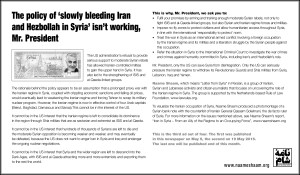Naame Shaam urges Obama to stop ‘slow bleeding’ policy towards Iran and Hezbollah, save Syria from disintegration
The Hague, 23 June 2015 – The campaign group Naame Shaam (1) today published the third open letter out of four to the US President in the Washington Post newspaper. The letter focuses on the catastrophic consequences of the Obama administration’s ‘slowly bleeding’ policy towards Iran and Hezbollah in Syria and how it goes against US interests.
“The policy of slowly bleeding Iran and Hezbollah in Syria isn’t working, Mr. President,” reads the headline.
The open letter continues: “The US administration’s refusal to provide serious support to moderate Syrian rebels has allowed Iranian-controlled militias to gain the upper hand in Syria. It has also led to the strengthening of ISIS and al-Qaeda-linked groups.”
“The rationale behind the policy appears to be an assumption that a prolonged proxy war with the Iranian regime in Syria, coupled with crippling economic sanctions and falling oil prices, would eventually lead to weakening the Iranian regime and forcing Tehran to scrap its military nuclear program.”
“However, the Iranian regime is now in effective control of four Arab capitals (Beirut, Baghdad, Damascus and Sanaa).This cannot be in the interest of the US. It cannot be in the US interest that the Iranian regime is left to consolidate its dominance in the region through Shia militias that are as sectarian and extremist as ISIS and al-Qaeda.”
“It cannot be in the US interest that hundreds of thousands of Syrians are left to die and the moderate Syrian opposition is becoming weaker and weaker, and may eventually be defeated, because the US does not want to anger Iran in Syria and Iraq and endanger the ongoing nuclear negotiations. It cannot be in the US interest that Syria and the wider region are left to descend into the Dark Ages, with ISIS and al-Qaeda attracting more and more extremists and exporting them to the rest the world.”
The letter then asks President Obama to:
- “Fulfil your promises by arming and training enough moderate Syrian rebels, not only to fight ISIS and al-Qaeda-linked groups, but also Syrian and Iranian regime forces and militias.
- Impose no-fly zones to protect civilians and allow humanitarian access throughout Syria, in line with the international ‘responsibility to protect’ norm.
- Treat the war in Syria as an international armed conflict involving a foreign occupation by the Iranian regime and its militias and a liberation struggle by the Syrian people against this occupation.
- Refer the situation in Syria to the International Criminal Court to investigate the war crimes and crimes against humanity committed in Syria, including Iran’s and Hezbollah’s role.”
The open letter ends with the message: “Mr. President, only the US can save Syria from disintegration. Only the US can seriously pressure the Iranian regime to withdraw its Revolutionary Guards and Shia militias from Syria, Lebanon, Iraq and Yemen.”
The open letter was accompanied by a photomontage of a Syrian bank note, which Naame Shaam had produced to visualize the Iranian occupation of Syria, carrying the counterfeit of Iranian General Qassem Soleimani, the de facto ruler of Syria. (2)
The last letter from Naame Shaam to President Obama will be published in the same newspaper at the end of June 2015.
Notes for editors:
- A pdf of page A3 of the Washington Post, 23 June 2015, where the open letter was published, can be found below.
- The first open letter as published in the Washington Post on May 5, 2015.
- The second open letter as published in the Washington Post on May 19, 2015.
1. Naame Shaam is a group of Iranian, Syrian and Lebanese activists and citizen-journalists that focuses on uncovering the role of the Iranian regime in Syria. Naame Shaam (نامه شام) means “Letter from Syria” in Persian. For more details about the group and its activities, see www.naameshaam.org.
Naame Shaam is supported by the Netherlands-based Rule of Law Foundation, www.lawrules.org.
2. See: www.naameshaam.org/new-syrian-banks-notes/
3. On 23 April 2015, a Naame Shaam representative handed a copy of the new report, “Silent Sectarian Cleansing: Iranian Role in Mass Demolitions and Population Transfers in Syria”, and other relevant information to the Office of the International Criminal Court (ICC) Prosecutor in The Hague. Naame Shaam called on the Prosecutor to open an investigation into these crimes. This should include the role of Iranian officials and commanders, particularly General Qassem Soleimani. See here.
This report was published on 18 May 2015. See here.
4. In November 2014, Naame Shaam published an in-depth report on the role of the Iranian regime in the ongoing war in Syria. See the full report, “Iran in Syria: From an Ally of the Regime to an Occupying Force”, available here.
The report provides numerous examples and case studies of human rights violations, war crimes and crimes against humanity committed in Syria by Iranian-controlled militias and forces, including the ‘crisis cell’ assassination in July 2012 and the Ghouta chemical massacre near Damascus in August 2013. It also highlights ways of bringing possible lawsuits against Iranian regime officials, such as Gen. Qassem Soleimani, the commander-in-chief of Sepah Qods, the foreign arm of Sepah Pasdaran (Iranian Revolutionary Guards).
The authors argue that there is sufficient evidence for the ICC to try the military and political leadership of Iran for complicity in various crimes committed in Syria. This ranges from inciting, endorsing and adopting specific criminal and terrorist acts to aiding and abetting war crimes and crimes against humanity. The 2014 report also presents a legal case for treating the war in Syria as an international conflict that involves a foreign occupation by the Iranian regime and its militias and a liberation struggle by Syrian people against this foreign occupation, as defined by the 1907 Hague Regulations and the Fourth Geneva Convention of 1949.
Attachment: pdf of page A3 of the Washington Post, 23 June 2015
 English
English  فارسی
فارسی  العربية
العربية 





 On Twitter
On Twitter